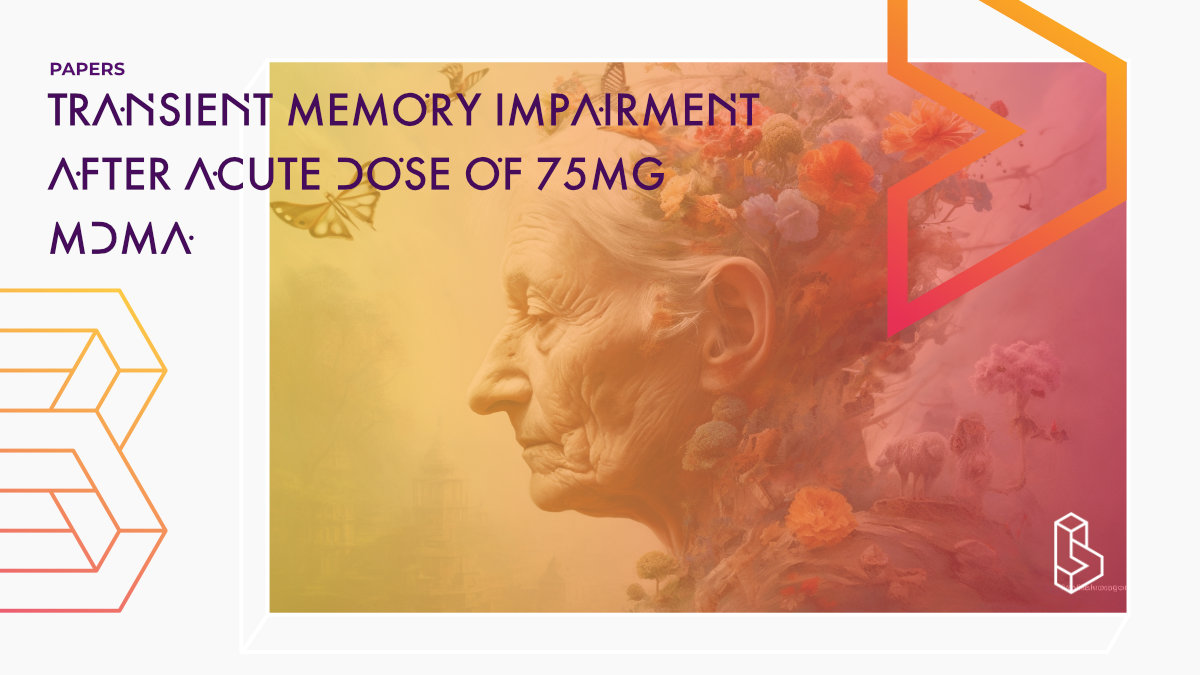This double-blind, placebo-controlled, crossover-design study (n=18) investigated whether MDMA (75mg) causes memory impairment during MDMA use or whether polydrug (tested with 20mg Ritalin) use is a confounding factor. It was found that a single dose of MDMA did indeed produce transient memory impairment.
Abstract of Transient memory impairment after acute dose of 75mg MDMA
“A range of studies has indicated that users of 3.4-Methylene-dioxymethamphetamine (MDMA, ‘Ecstasy’) display cognitive deficits, particularly memory impairment, as compared to non-drug using controls. Yet it is difficult to determine whether these deficits are caused by MDMA or some other confounding factor, such as polydrug use. The present study was designed to establish the direct relation between MDMA and memory impairment under placebo-controlled conditions. Eighteen recreational MDMA users participated in a double-blind, placebo-controlled, 3-way crossover design. They were treated with placebo, MDMA 75mg and methylphenidate 20mg. Memory tests were conducted between 1.5-2h (intoxication phase) and between 25.5-26h (withdrawal phase) post-dosing. Results showed that a single dose of MDMA caused impairment of immediate and delayed recall on a verbal learning task during the intoxication phase. However, there was no residual memory impairment during the withdrawal phase. Subjects reported more fatigue and less vigour but no symptoms of depression during the withdrawal phase of MDMA treatment. Methylphenidate did not affect memory or mood at any time of testing. A single dose of MDMA produces transient memory impairment.”
Authors: Kim P. C. Kuypers & Jan G. Ramaekers
Summary of Transient memory impairment after acute dose of 75mg MDMA
MDMA, the main psychoactive constituent in the popular recreational party drug Ecstasy, has been frequently associated with cognitive impairments. However, it is difficult to infer whether MDMA is neurotoxic in humans due to confounding factors and unknown doses.
To date, only two studies have attempted to assess the effects of MDMA on memory during intoxication. Both studies used quasi-experimental, between-subjects designs with multiple test sessions. They showed that MDMA users tended to perform worse on memory tasks during intoxication than normal controls.
The present study was designed to overcome the interpretational problems in quasi-experimental designs by looking at the acute and residual effects of a single dose of MDMA on memory functioning in MDMA users.
Find this paper
Transient memory impairment after acute dose of 75mg 3.4-Methylene-dioxymethamphetamine
https://doi.org/10.1177/0269881105056670
Open Access | Google Scholar | Backup | 🕊
Cite this paper (APA)
Kuypers, K. P., & Ramaekers, J. G. (2005). Transient memory impairment after acute dose of 75mg 3.4-Methylene-dioxymethamphetamine. Journal of Psychopharmacology, 19(6), 633-639.
Study details
Compounds studied
MDMA
Topics studied
Safety
Healthy Subjects
Study characteristics
Original
Placebo-Controlled
Active Placebo
Double-Blind
Within-Subject
Randomized
Participants
18
Humans
Authors
Authors associated with this publication with profiles on Blossom
Kim KuypersKim Kuypers is a researcher at Maastricht University. Her work is concerned with understanding the neurobiology underlying flexible cognition, empathy, and well-being. One of the main ways she does is with the use of psychedelics.
Johannes Ramaekers
Johannes Ramaekers is a professor at Maastricht University his work focuses on behavioral toxicology of drugs and combines methods from psychopharmacology, forensic toxicology and neuroscience to determine drug-induced changes in human performance. Some of this research is done with DMT.
Institutes
Institutes associated with this publication
Maastricht UniversityMaastricht University is host to the psychopharmacology department (Psychopharmacology in Maastricht) where various researchers are investigating the effects of psychedelics.
Compound Details
The psychedelics given at which dose and how many times
MDMA 75 mg | 1xLinked Research Papers
Notable research papers that build on or are influenced by this paper
Acute dose of MDMA (75 mg) impairs spatial memory for location but leaves contextual processing of visuospatial information unaffectedThis re-analysis of a double-blind, placebo-controlled, crossover-design study (n=18) compared the effects of MDMA (75mg) and Ritalin (20mg) concerning spatial memory performance. Results indicated that a single dose of MDMA caused subjects to perform worse on a simple spatial memory task only during acute intoxication. It did not affect their ability to detect rapid contextual changes in visuospatial information relevant to traffic safety.
Linked Clinical Trial
MDMA and memoryThis completed interventional trial (n=16) investigated the impact of MDMA (75mg) on memory.

